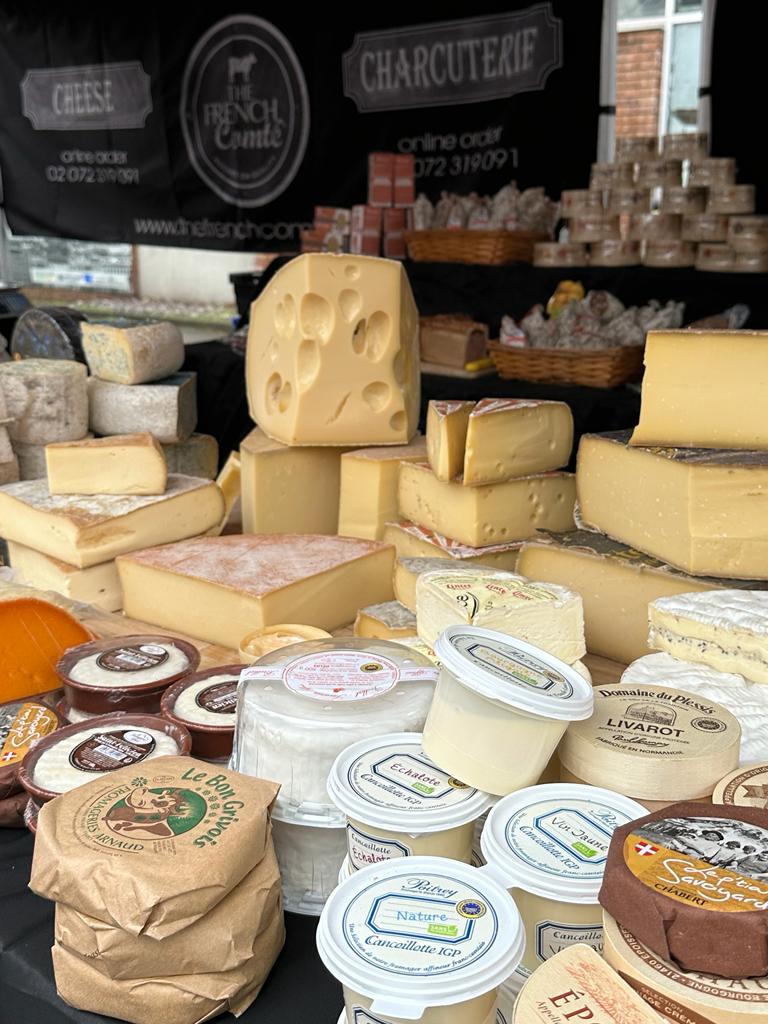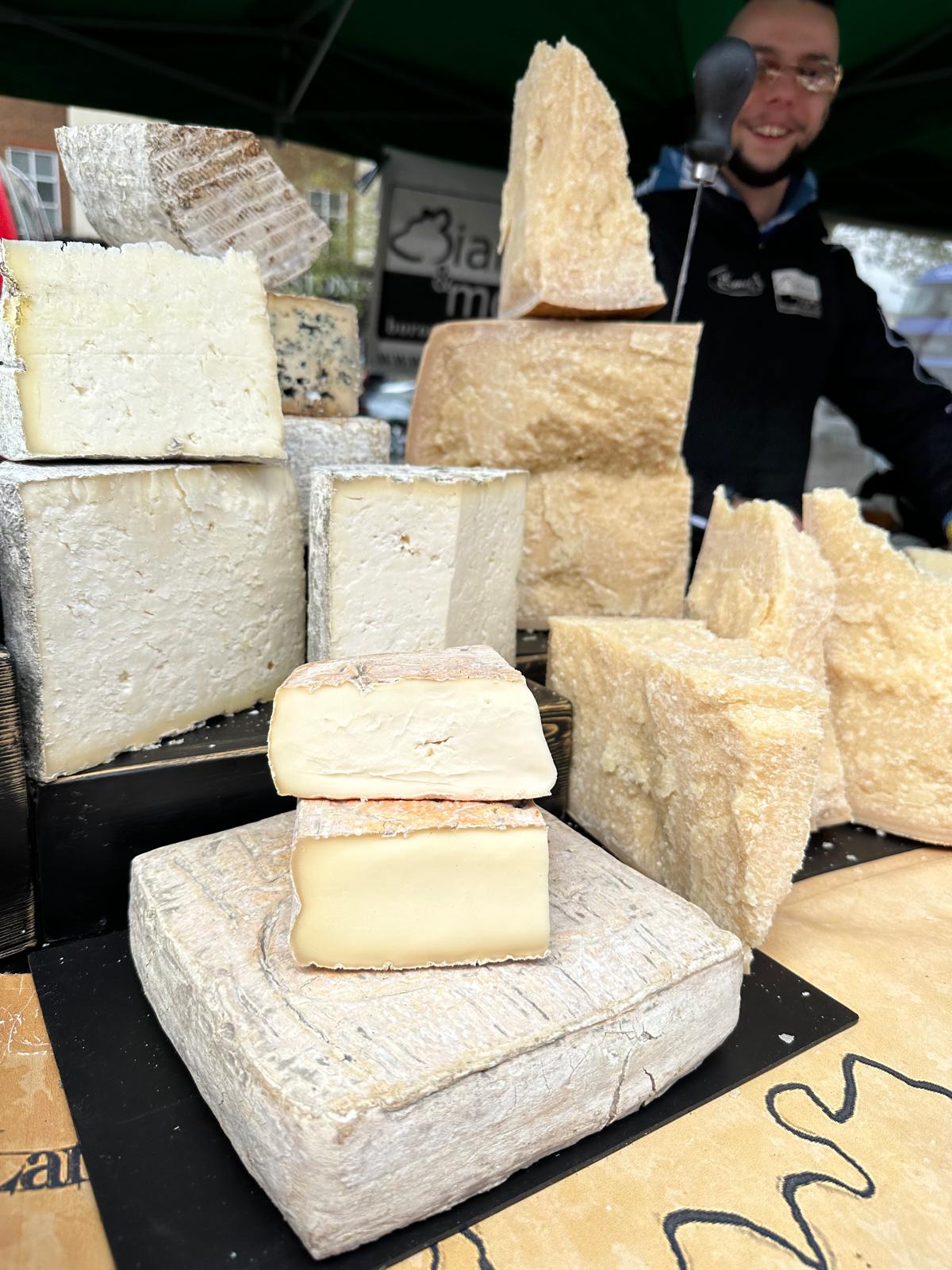Free digital copy
Get Speciality Food magazine delivered to your inbox FREE
Get your free copy
On the third Sunday of each month, in the leafy London suburb of Chiswick, a community has been growing. A community of cheese lovers, cheesemakers, cheesemongers, and cheese experts, coming together to worship at the altar of dairy…to celebrate cheese in all its forms.
Founded during Covid times as almost an attraction to help people get out of the house to enjoy good quality food, Chiswick Cheese Market’s appeal has snowballed, bringing in visitors from across the UK, as well as attracting foreign tourists. It has become so much more than a market. Today, the event is an incubator for new talent, run by a collective of foodies who relish the opportunity to help usher in the next generation of cheesemakers, giving them a platform for success.
One of those enthusiastic volunteers is chef Lucy Cufflin who, alongside chef Jo Pratt, was dismayed at the lack of cookbooks being introduced at Chiswick Book Festival, where they’d both been invited to present pre-Covid.
Determined to change the tide, Lucy and Jo brought together a group of 10 chefs, cookery writers, authors and designers, with an aim to ensure sure cookbooks found their rightful spot at the festival. The idea took off, and soon a cookbook festival popped up alongside the main event, with plans for supper clubs and other extensions of the programme.
And then Covid hit. “Our high street, like everyone else’s, suddenly came alive again,” Lucy says of that time. “It was all looking a bit sad before, and everyone was keen to keep that momentum up. Some friends of ours fought to use the public car park on High Road for a flower market, to encourage people to come and be outside, and we joined forces, taking the spot on the third Sunday of the month.”
Why the shift from cookbooks to a cheese market? It just made sense, says Lucy. “Chiswick literally means cheese farm. It was originally called Cheesewick. In the 1500s there was a cheese farm there that made rather a lot of cheese, and there used to be a big cheese fair. People brought in cheese from outside London, and it was bought, and taken into London. That was right along the Thames.”
Their cause was helped by chef Jamie Oliver, “who did a big shout out for cheesemakers during Covid. A lot of small makers relied on restaurants to sell, but of course they were shut. We knew cheesemakers were in trouble, so we brought cheese home to Cheesewick!”
Lucy says the market was hugely supported from the first day, with 20 stalls, and lots of measures in place to protect the 2,000 or so food lovers who attended the launch during the pandemic, from designated entry and exit points, to hand sanitising stations.
Today more than 50 traders make the journey to Chiswick every month, from mongers to makers, and Chiswick Cheese Market has become a hub for the industry. A place where knowledge can be exchanged. Between the organisers and the public. Between traders. And between makers. “We’ve got to know every producer really well,” says Lucy, “and we’re always introducing new things. Pevensey Blue, for example, was first sold here, and it went on to win Reserve Champion at the Artisan Cheese Awards.”
What makes Chiswick extra special, Lucy adds, is that each stall is dedicated to a place, region, or variety. “We have specialists selling only cheese from Greece. Or Mellis will bring cheeses from the Highlands. It’s always changing. There’s always something new to try.”

Something the team are proud of is the education side of the market. At every event, the ‘HQ’ tent is dedicated to an aspect of the cheese industry, ensuring visitors go away with more than a bagful of products…they’ll learn something too. A recent market saw a dairy bring in cheeses aged at a week, four months and a year, with the public encouraged to try them, experience their differences, and understand and appreciate the skill that goes into affinage.
In August a Greek cheesemonger and Greek wine merchant joined forces to dispel the myth that Greek cheese is all feta and halloumi. “We love that element of learning we can provide,” Lucy says proudly.
The market gives away any profits, which are distributed between projects that include a local shelter (who the team also support physically with anything they might need), and various initiatives for disabled people.
Cash also goes towards supporting the next generation of cheese folk, thanks to a grant Chiswick Cheese Market co-funds with the Academy of Cheese. “Last year we supported four new cheesemakers. These are people who might be making at home, and need education and help to get into commercial premises. Between us and the Academy, we offer the money up front, help them get that education, and help get their cheese on the market. One of our first grant recipients recently brought his cheese to the market with one of our traders which was very exciting. And we’ve just got five new grantees this year.”
It is an assortment of people, Lucy says, from all walks of life. Some are completely new to cheese, others might be working on a small scale, trying to shift production from one type of product to another.
“One of our grants last year went to a farmer’s daughter making Brie in a converted container on her dad’s farm. She wanted to make Gouda, which she’s now been able to work on.”
Though the grants are set out for a year, Lucy says that hasn’t actually been the case, and that she sees the market continually working with grant recipients in what has become “a little cheese family”.
“It’s a community where they know they can just have a voice at the other end of the phone to encourage and drive them. Or they can get a bit of industry knowledge. The grant has changed an awful lot since we started. At the beginning we just aimed for what we thought they would need. It was different after the first year, and has changed again this year. It’s all very exciting!”
Lucy and another member of the team, Abigail Pitcher, have even taken on training themselves, with the pair currently working to the Academy of Cheese’s Level 3. “We’ve been cheese judging too. We’ve really taken on the mantle of learning about cheese and the technical side of it. We love it. The more we learn, the more we want to learn. The rest of the team will do Level 1 together this year too.”

Britain’s cheese industry, from makers, to purveyors of both British and continental varieties, is something of real value, Lucy says passionately. “I think it’s really important to the future of food.” And Chiswick Cheese Market has its part to play. “I hope we are helping the public to understand what real artisan cheese is. It’s about the quality of soil and grass. It’s about the kindness with which the animals are treated to make the milk the best it can possibly be. It’s about the lack of additives. About buying products that have been loved right from the get-go. When you meet the cheesemakers, they have such a love for every part of the process. Not all of them farm, but they all know where their milk is from, they know the animals.
“Where we come in is we are bringing that knowledge to the marketplace and introducing people to the exceptional flavours that are there within the artisan cheese world that do not appear in mass-produced cheeses.”
There are now upwards of 1,000 varieties of cheese being made in the UK, which in turn is stimulating interest in homegrown varieties, adds Lucy. “In France they are fairly restricted. If I lived in Normandy and told my mother I was going to make a hard, blue-veined goats’ cheese, she’d tell me ‘no, we make Camembert’. In the UK we don’t have that long history of artisan cheesemaking and food. I could announce I wanted to make that cheese here, and everyone would say, ‘hey, great’. There’s the most vibrant movement going on at the moment and it’s a brilliant thing to be part of.”
Visitors to Chiswick Cheese Market have access to an enviable array of products, but that doesn’t mean the organisers can’t see patterns emerging. Lucy is noticing, for instance, a lot more interest in sheep’s and goats’ milk cheeses. “Some people have always thought goats’ cheese is a young white log of something that tasted rather ‘herdy’. But now we have such a variety of cheese. And I’ve noticed they are much less likely to say, ‘I don’t like goats’ cheese’ once they’ve tried one here that’s really buttery and full of flavour, or hard with crystals and a bit of texture. I’m seeing a definite broadening of people’s minds.”
Buffalo milk cheese is another area of interest with some “big, powerful flavours” out there. And customers are enjoying the milky, rich, nutty profile of Alpine cheese too.
Shops in Chiswick tell market organisers it’s the busiest day of the month for them. Traders have the same feedback, with many saying it’s one of their biggest markets in terms of revenue. This, in turn, has made clinching a spot at the market very attractive, with a waiting list for stallholders. Though, Lucy adds, the market licence is renewed every six months, with expansion on the cards, so it’s always worth getting in touch, particularly if you’re doing something different.
“We really do try to curate and experiment so we’re always moving and changing and showcasing things people won’t find anywhere else. We want to offer the widest choice possible, and some stalls will only have one type of cheese – the best. It’s about keeping what we do balanced, which keeps visitors coming back.”
There is just one stall, for instance, dedicated to Parmigiano Reggiano. “Last month we had Victoria’s Cheese from Norfolk here, selling only cheese from Suffolk and Norfolk. We have a stall that’s only cheeses from Sussex. And No2 Pound Street will just bring four cheeses to each market, giving them the time to tell the story of each one. Often people will go to them and buy all four cheeses, and next time they’ll make a beeline to them to buy more.”
There will always be rare cheeses. Specialist cheeses most won’t have heard of. “For us, we want to work with people who have a USP. And that doesn’t just have to be cheeses, it can be something sideways. So Smoke & Cure, for example. They smoke salmon and they just provided the salmon for the Japanese royal visit because they are considered the best quality. They also sell some very interesting cheeses and bring other things that work well on a cheeseboard. We’re always on the lookout for traders who can bring something new to the table. Chutney. Honey. Maybe even the cheeseboards themselves!”